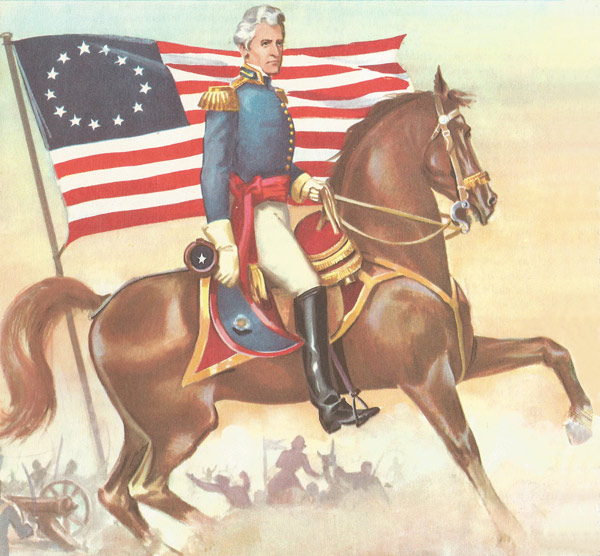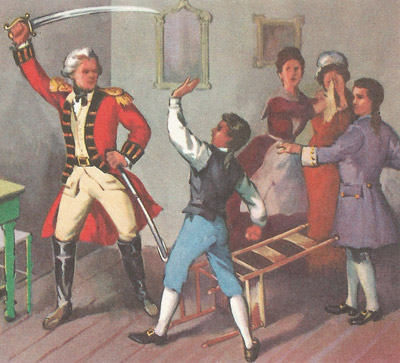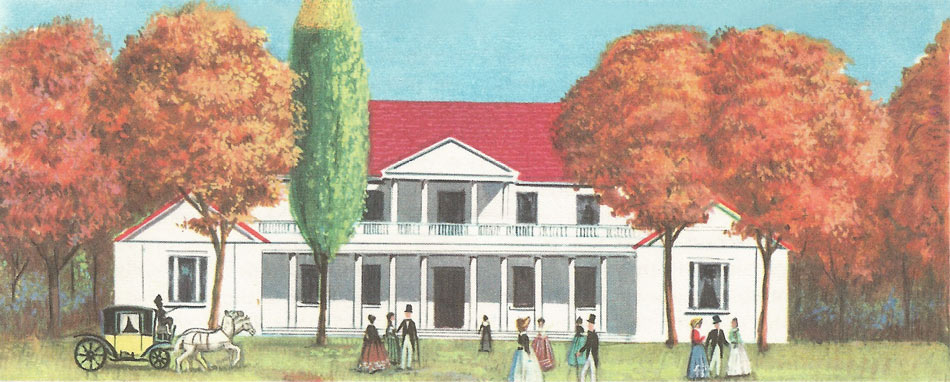Jackson, Andrew (1767–1845)

Andrew Jackson was the commander of the United States forces against the British at the battle of New Orleans in the war of 1812.

When he was a boy Jackson defied a British officer, who struck him with his saber.

Jackson's home near Nashville, Tennessee, was called the Hermitage.
On 4 March 1829 a tall, rugged, weather-beaten man, nearly sixty-two years old, became the seventh president of the United States. Never before had Washington seen an inauguration like the one for Andrew Jackson of Tennessee, nor has there been one like it since.
In the huge crowd were many frontiers-men from the Wild West - hunters dressed in buckskin, with their shoulder-length hair. Many of these visitors carried pistols and rifles which they fired into the air by way of celebration. When the ceremony was over they broke through the barriers on the Capitol steps to shake the new President's hand. They swarmed into the White House, uninvited, smashing china and glasses and overturning the furniture. Finally they had to be lured out by large bowls of punch set out on the lawn. The sedate and respectable citizens from America's eastern states were horrified by such rowdy behavior and wondered with anxiety about the man who had just become their president. For the happy rioters were people from the rapidly growing communities of the western frontier, and they were celebrating the fact that one of their own people had just become President of the United States.
Up to that time the presidents had been educated, well-to-do men from Virginia or New England. But Andrew Jackson was quite different. He had been born and bred on the frontier where there was little time for education. Like all western pioneers, his life had been full of danger and hardship, and he was little used to smart ways and polite society.
Upbringing
Jackson's parents were Scottish-Irish immigrants who had come to America in 1765 and settled in what was then still the British colony of South Carolina. Two years later Andrew was born in a log cabin in a settlement in the dense wilderness known as Waxhaw. His father had died a few days before.
Little is known of his childhood apart from the fact that he earned the reputation of being the wildest youngster in a wild community. Certainly he did not get much education: the frontier schools were not good, and in any case Andrew had no love of book learning. To the end of his life he never learned to write or speak English grammatically.
When he was only thirteen he joined the local militia in order to fight in the War of Independence against the British, and soon afterwards he and an elder brother were taken prisoner. On one occasion while he was in captivity a British officer ordered Andrew to polish his boots for him. When the hot-headed boy refused, the officer struck him with his sabre. Jackson bore the scar from this blow for the rest of his life and always had a great dislike for the British.
The lawyer
The War of Independence left Jackson alone in the world. His brothers had been killed and his mother had died while nursing American prisoners of war. At first he tried his hand as a schoolmaster, although he himself barely knew how to read and write. Not making much headway, he then decided, at seventeen, to become a lawyer. In this he was much more successful, although he never knew a great deal about law, and two years later he was appointed a prosecuting attorney. On the western frontier in those days it was the duty of this official not only to prosecute law-breakers in court but also to arrest them. Moreover, accused men often came into court fully armed and accompanied by their lawless friends. And so it was perhaps more important that a prosecutor should by tough and quick on the trigger.
Jackson's rise was rapid. He helped to set up the new state of Tennessee, and before he was thirty its people had sent him to Congress as their representative. Here he attracted attention not so much by his speeches as by his backwoods dress and his hair tied up in an eel skin.
Jackson did not remain in Congress long. Mainly owing to financial reasons, he quickly returned to Tennessee, where he became a judge. He was also appointed to a post in the militia.
The soldier
It was as a soldier that Andrew Jackson was to become famous. He fought in the campaign against the Creek Indians and later, in the war of 1812, against the British. In 1815 he was the commander at the battle of New Orleans, where the British were badly defeated. Actually, this battle need not to have taken place, as a peace treaty had already been signed in Europe. But that made no difference to the people of the West. General Jackson was now their guest hero.
Later he fought against the Seminole Indians in Florida. As military governor of this territory his outbursts of temper and his high-handed methods often got him into trouble. This also happened in his private life. He fought several duels. killing some of his opponents.
Marriage
But, for all his violence and picturesque oaths, there was a gentle side to Jackson. He read the Bible regularly and was a devoted husband. His marriage to Rachel Robards was a very happy one, but, sadly, there were no children, and Rachel died before her husband became President.
She had to endure much, for by some strange accident Jackson married her before she was properly divorced from her first husband, and Jackson's political enemies made unscrupulous use of this fact to spread scandalous stories.
President
Jackson first stood for election as President in 1824. He had long been urged by his friends to do so, but at first had withstood their pleadings. 'No, sir,' he replied, 'I know what I am fit for. I can command a body of men in a rough way but I am not fit to be President.' Later, however, he changed his mind when he realized that the other three candidates were even more unfit than he was.
In 1824 Jackson received more votes than any other of the candidates, but he was not elected, as he did not obtain an absolute majority. One of his rivals then withdrew in favor of another, thus giving him the necessary number of votes.
Jackson believed that he had been tricked and determined to stand again. The campaign for the presidential election of 1828 was one of great violence. Jackson's enemies represented him as a drunkard, a gambler, and an assassin; they recalled all his duels and distributed little coffins bearing the names of his victims. They hoped that by these methods they would not only blacken his name but also provoked him into losing his temper and saying things which would shock the electors. But Jackson was no fool: he saw their game and wisely said nothing.
His supporters, meanwhile, were loudly proclaiming his cause. Everywhere was heard the cry: 'Hurrah for Old Hickory!' (This was the nickname given to Jackson because of his tremendous toughness.) When the result of the election was known Jackson had obtained more than double the number of votes of his opponent. And so in the following year, 1829, he was inaugurated as President.
The democrat
For the first time America had a President a man of the people - someone of humble birth who had endured great hardships and knew what it was to be poor. Jackson himself was a firm believer in democracy (government by the people), but there were times when he behaved in a very dictatorial fashion. He ruthlessly overrode opposition and was often guided by his personal likes and dislikes. Because of this his enemies used to refer sarcastically to his two terms of office as the reign of King Andrew.
When he became President, Jackson was determined to do something for his own people of the western frontier. He thought that at present they were being cheated by the bankers and big business men of the East who were arranging the financial affairs of the country to suit themselves. he was particularly hostile to the Bank of the United States which controlled the country's money. But the actions he took to destroy the Bank helped cause a great financial crisis in which business was crippled and there was wide unemployment.
In government business Jackson did not always consult his official advisers - even his cabinet officers were often ignorant of his plans. Instead he consulted a group of friends, nicknamed the 'Kitchen Cabinet', a term still used to describe a President's behind-the-scenes advisors.
Danger to the Union
Already in America at this time hostility was growing between the Southern and Northern states which eventually was to culminate in the Civil War. One of the causes of this quarrel was the question of tariffs - duties on foreign goods. The North wanted to keep these in order to protect their industries; the South, which had practically no industry, wanted to abolish them so they could obtain manufactured goods cheaper from abroad. In this dispute Jackson supported the North, and when the state of South Carolina announced that it would not obey a new federal tariff law, Jackson sent two warships to Charleston and made plans to invade the state, which quickly gave in.
Last days
Jackson was the sort of person that one either loved or intensely disliked. He certainly had a number of bitter personal enemies, but with the great mass of the American people he was greatly beloved. He spent his last years at his beautiful home, the Hermitage, near Nashville, Tennessee, and died there on June 8th, 1845. He lies buried in the garden.
